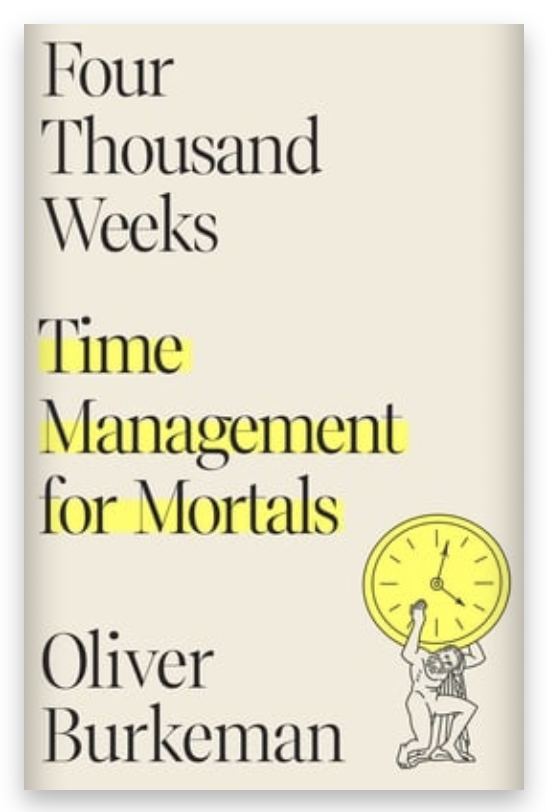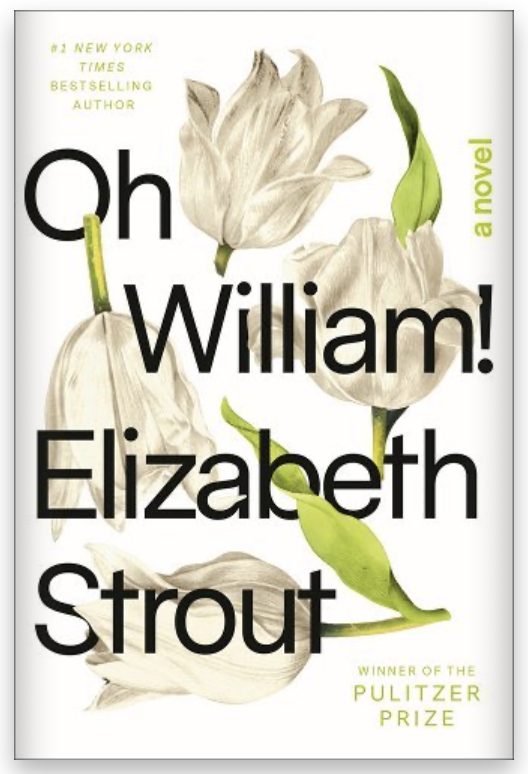I just finished Oliver Burkeman’s 4000 Weeks.
I thought it was excellent. Even though sometimes I felt judged (in a gentle way — as he argues effectively that the idea of ‘controlling one’s time’ is futile and likely backfires), I also felt seen. Life is finite. There is no arguing with that. We can’t do everything – or even close. Accepting that and applying our limited time supply to things that matter to us is the best we can do.
Even though I still yearn to do more things than comfortably fit some days, this book really made me question my true priorities. I also loved the idea of deciding what to fail at.
Finally, even though one might argue that my planning tendencies go against some of the principles in the book, at the end he talked about keeping two lists : one of everything (that you basically ignore), and one of a finite number of things that you will bring your attention to now. This is the essence of my “nested goals” system – you can’t do everything in a day / week / month / quintile / etc — so pull a finite list of things to focus on, and ignore the rest. I think he would approve of my morning planning ritual as long as I stop myself from adding a list of 348 things to accomplish in 24 hours.
Highly recommend this book – probably the best non-fiction/personal development title I read all year.
On a semi-related note, after watching the Amanda’s Favorites review video, I ordered the JMB Living Journal to review for the pod (and fine, because I just wanted to see it / try it!). If there was ever a planner that exudes coziness and intentionality, this is it.
So maybe my 2022 lineup is still in progress. lol . . .
What I am reading now:
This came in my Parnassus Books Book-of-the-Month (my last one I think!) and I’m so glad it did. How did I go this long without reading Elizabeth Strout!? I’m very excited to explore her back catalog. The finite nature of life (see above) is brought into stark reality whenever I think about how few books we each get to read in our lifetimes . . .



16 Comments
I read Four Thousand Weeks a few months back and I loved it, I might even read it again at the start of 2022. There is so much there that at the same time clashes with how I behave but aligns with how I feel…
Thanks Sarah for this review – I’m putting this book on my Christmas list! I’m a UK ED Dr who’s just pulled back from nearly full time to 3/4 due to the state of the UK NHS affecting my ability to have anything left ‘in the pot’ for my 3 young kids. I’m looking for reading that supports this decision (or challenges it maybe, either will make me think) – as the breadwinner for my family, it was a tough one!
I’m totally with you on feeling the finite-ness of life acutely when thinking about all the books there are in the world that I want to read. The other one that always gets me is the short-ness of my children’s childhoods.
I think that thinking seriously about what to choose NOT to pursue / try and achieve, or what to fail at as you put it, is probably a really important reflection for want-it-all-ers like myself. I cannot have the massive career AND a close relationship with my kiddos AND pursue all my interests outside medicine. Accepting this is so incredibly hard! Trying to work out what is most valuable (not in the financial sense) and what must be put down is, for me, I think, the key to a more contented life.
Really enjoying your blog, always have, but it seems to be particularly thought-provoking lately. Thanks!
Oh and everything Elizabeth Strout has written is excellent and worth reading!
Yeah.,,Burkeman was really clarifying for me, too.
Oh my goodness, reading “Amy and Isabelle” right now by E. Strout and it is… gripping, heartbreaking, and just perfectly written. Highly recommend!
I love Elizabeth Strout now, but she is definitely an author I did not like initially. I started with My Name is Lucy Barton and I just thought it was too quiet, too “too-many-things-unsaid.” (let me stress- this is how I perceived it, I know it’s v popular). But then I read Olive Kitaredge and Olive Again and LOVED both. I really liked Oh William, which makes me think I need to give MNILB a re-read.
Apart from incredible insights that never feel too heavy-handed, the characters interwoven lives in and among Strout’s work shows an impressive level of detail and talent!
Thank you for this comment. The only Elizabeth Strout I’ve read is My Name is Lucy Barton and I did NOT like it. The scenes depicting child abuse (being left in the truck — while not graphic they made me feel sick) were too much for me. Given your comment, maybe I should give her another try! Is it necessary to read in order, or could I start with Oh William?
You can definitely read Oh William as a stand-alone. Ann patchett made that clear when she picked it for the book of the month!
I agree with SHU. Any of the books stand alone- even Olive Again! And I don’t feel super-pressed to re-read MNILB, it’s just something I’m considering if only to see the interwoven plot lines from other novels.
I agree with Lisa that it’s worth reading the “misses” by Strout because the “wins” are so, so good.
I love Elizabeth Strout! Especially Olive Kittredge and Anything is Possible. The way she writes about ordinary life makes me want to be a writer myself. My Name is Lucy Barton wasn’t my favorite, but I want to go back and re-read it after enjoying Oh William!
I love Strout but not all of her books are hits for me. Specifically, I didn’t care for The Burgess Boys. But I will always read her books since I tend to like them and when I do, I usually really like them!
I need to read this book. I think being reminded of the finiteness of life can be depressing but also helps you think through your priorities. I remember you sharing a blog post that talked about the estimate for how many more days we have with our parents. It was sobering – especially when factoring in how little many of us saw our families during the pandemic! I don’t read many productivity type of books which is kind of strange since I love planning, and I’m an upholder/productivity-focused person… But this sounds like one worth reading. Maybe in the new year to jump start my year.
I think that Four Thousand Weeks is one of those books that slowly sinks deeper into your psyche, too. I finished it a month ago and think about it every day and am planning to reread in 2022.
The two biggest takeaways for me were:
1) Choosing something to FAIL at. He doesn’t say pick something to de-prioritize. He doesn’t say leave things off your radar or avoid them. He doesn’t even advise quitting (though that can work, too). That word just seems so…unlike my gold-star loving, Type-A personality. It’s deliberate and adds weight to the game of being mindful about priorities.
2) Picking ONE project to focus on. I seem to always have 82 projects on the go (slight exaggeration), and this was enough incentive for me to hone in on one particular project I’ve been dragging my feet on FOR YEARS. Within a few days it was all done. I’m continuing to apply this logic to other projects, prioritizing one until it’s 100% completed before moving on to another. Obviously this doesn’t always work – I do have to juggle multiple open-ended projects – but I’m aiming for it where possible.
And..how about The Last Time? How you often don’t know…when you’ve done something for the last time,
I just finished this book too…on your recommendation! I really enjoyed it. I felt a little called out too…but I think in a good way. It made me think of my time and todo list in a completely different way. Thanks for the recommendation!
P.S. Love your podcast and I love your guest “appearance” on 10 Things! Nice Job!
I’m almost done 4000 Weeks and i have so many highlights and notes. I find it really has helped me think about how I frame my current state of unemployment and think ahead to what I want when I am lucky enough to find work again.
Burkeman’s idea that we are time (as opposed to we control time or time is a tool) brings to mind something my therapist said about how we have to remember that we are human “beings” not human “doings”. It is so easy to get caught up in doing all the things on my to do list that I forget to think about the person I want to be.
The other “aha” moment was his idea of “settling” and how we always say we don’t want to settle for something (partner, job, etc.) but refusing to settle is just as much an act of settling. I mean there is of course a baseline, but the pursuit of something into an infinite standard is settling just as much as deciding something is good enough.
I started 4000 Weeks but lost interest. I found it to be depressing and the author to be a pseudo-intellectual. I loved his Guardian columns but this book was a dud for me.